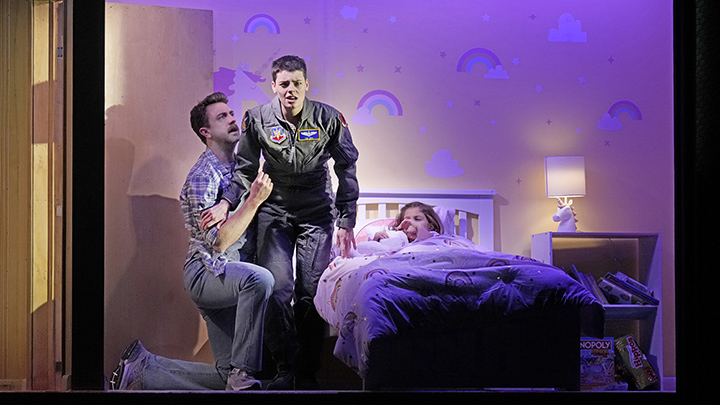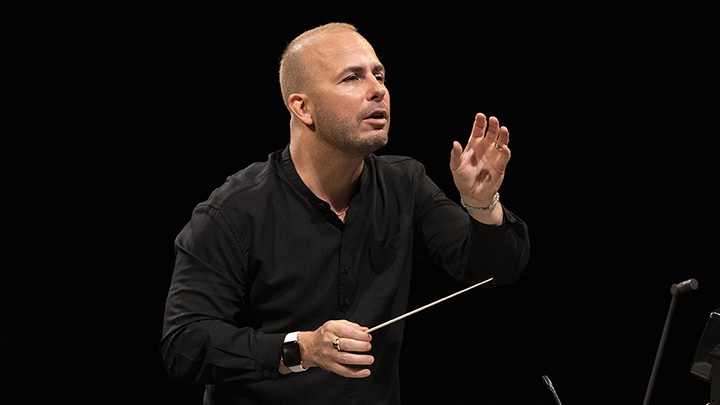

Dario Acosta
The disaster for the performing arts in the USA continues to worsen. Final month the Detroit Opera introduced the cancellation of its deliberate 2025/26 season opener, La fanciulla del West. This was blamed on a shortfall in grants, donations and ticket gross sales – a deficit that occurred even earlier than the meteor of funds cuts lately enacted by Congress strikes state and native budgets.
On the similar time, newspapers proceed to intestine their performing arts protection. Whereas one can argue whether or not newspapers nonetheless play a lot of a job in driving attendance, my off-the-record discussions with a number of performing arts organizations means that protection of upcoming occasions does assist their advance ticket gross sales. Nevertheless, a current Sunday Arts and Leisure part (July 20) had no articles about music or any listings of upcoming occasions.
So, the pure response to this singularly shitty cultural second and mass extinction occasion for the performing arts is to publish one more article demonizing Peter Gelb, this one by Jeffrey Arlo Brown in The Baffler. Brown, who is likely one of the editors of VAN Journal, declares Gelb to be an utter failure at each monetary stewardship of the Met and selecting repertoire for the home. I don’t wish to relitigate the funds of the Met; we will save that for every time the Met publishes its subsequent set of monetary statements. Nevertheless, I do wish to discover Brown’s assertions about repertoire.
He claims that the Met ought to be a “lodestar for opera worldwide.” Since its inception, the Met has all the time been an organization devoted to offering the most effective opera that cash might purchase. There wouldn’t even be a Metropolitan Opera if the Academy of Music had not denied New York’s newly rich industrialists entry to the Academy’s coveted non-public packing containers. These rich patrons anticipated famend singers in mainstream works. The Met didn’t search to broaden the repertoire considerably; the truth is, the Met didn’t current a world premiere till almost 30 years after it opened when it offered La fanciulla del West.


Louise Homer as Mona
From there, it did proceed to premiere new works, together with ones by American composers however the decisions of composers have been largely ‘secure.’ (Has anybody heard a efficiency of Horatio Parker’s Mona? It received a contest sponsored by the Met!) More difficult new works took their time making their option to the Met stage. For instance, Pelléas et Mélisande took 20 years and Wozzeck 34 years.
Extra lately, a technique that the Met has led different corporations has been with Stay in HD shows – stay in film theaters or afterwards by way of the Met Opera on Demand. Mr. Brown dismisses Stay in HD as a manner for operagoers to munch on popcorn throughout performances. On the “Stay in HD” shows that I’ve attended, viewers decorum has been a lot better than at a typical film screening. Quiet snacking occurred in the course of the intermissions.
Furthermore, the Stay in HD shows accomplish two vital objectives for the Met: reinforcement of the concept that the Met is a “premiere” model in opera and making a bond to opera lovers which can be removed from NYC. The Met does obtain many donations from outdoors of New York and these HD shows serve to inspire items from patrons who could by no means get to the Met recurrently in individual. Because of the Met’s management, most different main opera corporations have significantly elevated their video choices in cinemas and on demand. I, for one, am fairly grateful for this development.
Because the pandemic, the Met has additionally considerably rebalanced the composition of a typical season in direction of new operas. Whereas some smaller US corporations had already achieved this, the Met was the primary main firm to take action. No different massive firm has adopted Gelb’s lead. Usually, this adventuresome programming (particularly by the Met’s requirements) can be lauded. As a substitute, Gelb has obtained crucial brickbats for the works he has chosen to curate for the Met. Mr. Brown denounces most of those current premieres as pabulum and decries them as mediocre music with apparent, hackneyed plots. He dismisses them as “second display screen operas” which means they’re works that are supposed to be loved within the background when you’re doing one thing else in your cellphone.


Ken Howard
He has significantly savage criticism for The Hours, Grounded, and Champion. He’s entitled to his opinion, however one is led to query his bona fides when he dismisses Jeanine Tesori because the composer of “such groundbreaking works as Shrek: The Musical.” No less than give her credit score for being the composer of two of the best musical theater works of the twenty first century in Caroline, or Change and Enjoyable Dwelling.
I don’t fault the Met for presenting any of those works, even when The Hours is the one one of many three I wish to see once more. Nevertheless, Mr. Gelb undermined his give attention to new works with a comically misguided visitor essay for The New York Occasions that managed to antagonize each remaining American classical music critic and knowledgeable opera lover.
In “Find out how to Save Opera in America? Make It New Once more,” he argued that opera corporations in America may very well be revitalized by way of “new operas by residing composers and reimagined productions of classics that may resonate with audiences of at the moment.” Sadly, to make his case for brand new operas by residing composers, he selected to dismiss a lot of operatic output of the second half of the 20 th century as experimental, principally atonal compositions that might by no means attraction to massive audiences. He singled out Ligeti’s Le Grand Macabre as his major instance of a piece that might by no means be a hit on the Met, regardless of an ecstatically obtained sold-out run subsequent door on the New York Philharmonic in 2010. Moreover, he asserts that any critic that dislikes his repertory decisions will ultimately be seen as being on the flawed aspect of historical past.
Naturally, this excessive show of ego ends in opera lovers’ getting out their lengthy knives and operatic wishlists to indicate that they’ve higher style than the Met’s basic supervisor. For Mr. Brown, he cites works together with Luigi Nono’s Intolleranza 1960, Morton Feldman’s Neither, Claude Vivier’s Kopernikus, Olga Neuwirth’s Misplaced Freeway, and Salvatore Sciarrino’s Lohengrin. They’re all definitely price seeing, however most of those are manner too small in scale to work successfully on the Met. As soon as once more, one needs for the Met to discover a option to current “smaller” works in an acceptable venue. Nevertheless, anybody who needs to critique the Met on repertoire has to concentrate on what (a) will work in a 4,000 seat home and (b) will appeal to a donor keen to half with the $2.5 million it prices to mount a brand new manufacturing on the Met.


RICHARD TERMINE
Additionally, one assumes that every one the brand new works on the Met have the backing and assist of Yannick Nézet-Séguin. Whereas it’s straightforward to criticize Gelb’s style, the composers with new works coming to the Met are the identical composers getting commissions from the Philadelphia Orchestra. I can’t discover any proof that Nézet-Séguin’s has carried out a lot (if any) Ligeti or equally “thorny” works. The Met’s Music Director might doubtlessly sway the board to current tougher works, however I don’t know if even Nézet-Séguin has that sort of sway within the present fiscal and cultural setting. Look how lengthy it took for the Met to grant Jimmy’s want and produce Moses und Aron and that was throughout a interval of a lot larger fiscal stability. We’ll have to attend for the subsequent regime to see Le Grand Macabre, The Bassarids or Messiaen’s Saint François d’Assise or [your pet project goes here].
Because the performing arts group with, by far, the biggest funds in America, there’s a tendency to view the Met as an organization that ought to be capable to fulfill any want that an opera lover can think about. There’s a associated perception that the Met can affect the repertory at different corporations. Definitely, if the Met had an enormous success with a uncared for work like Roger Classes’s Montezuma, there would in all probability be a Montezuma-boomlet, if solely as a result of the one manner that the Met would stage Montezuma can be as a co-production with a number of corporations.
So whereas we might imagine that Gelb ought to be able to granting our needs, in actuality, he’s answerable for a corporation with excessive fastened prices, excessive fiscal challenges, a conservative board, and a dwindling provide of main donors keen to provide the Met the various hundreds of thousands that it wants.
So, I feel quite a lot of the frustration with Gelb is with how he’s chosen to speculate his assets in Met premieres. With the demise of OONY and Metropolis Opera, the probability that we’ll see any of the operas on our wishlists in New York grows more and more distant. Gelb’s conceitedness about his decisions simply provides insult to perceived damage.
For these of you who’ve made it this far, is there an opera firm that you simply take into account the “lodestar” – an organization that helps outline the repertory and a up to date opera manufacturing type? At one time, I might need stated that Bayreuth or Stuttgart set the path for opera productions, however now there isn’t a apparent reply.
Daybreak Fatale
Richard Lynn is a New York Metropolis primarily based opera lover who writes at parterre field below the identify Daybreak Fatale. His love of opera began at a really younger age when he used to take heed to the Met broadcasts and obsessively learn again problems with Opera Information in lieu of socializing at household gatherings. In faculty, he majored in Chemistry whereas taking as many music and theater programs as doable. He labored at the Music Library to get entry to the opera recordings that have been off limits to undergraduates. Because the early Nineteen Nineties he has been writing about opera at parterre field and different publications and is especially the evolution of staging and efficiency practices.
